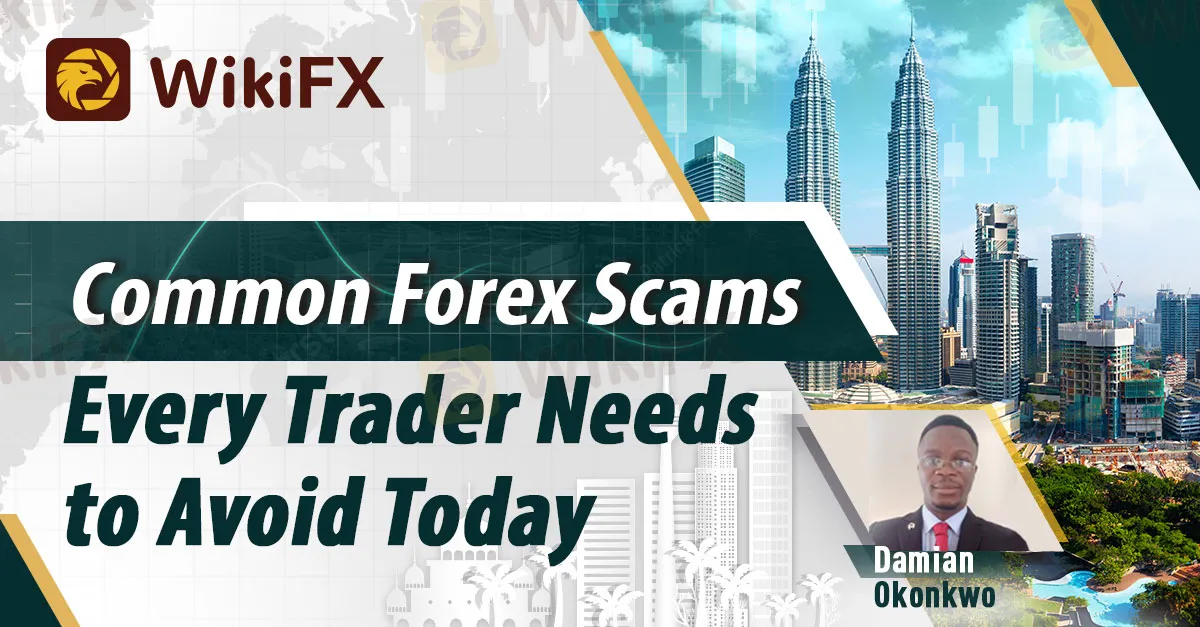简体中文
繁體中文
English
Pусский
日本語
ภาษาไทย
Tiếng Việt
Bahasa Indonesia
Español
हिन्दी
Filippiiniläinen
Français
Deutsch
Português
Türkçe
한국어
العربية
Common Forex Scams Every Trader Needs to Avoid Today
Abstract:In the fast-paced world of forex trading, the potential for substantial profits attracts countless individuals seeking financial success. However, alongside legitimate opportunities lie numerous scams designed to exploit unsuspecting traders.

By: Damian Okonkwo

Common Forex Scams and how to avoid them
a) Ponzi and Pyramid Schemes
Ponzi and pyramid schemes promise quick and high returns on investments, often through forex trading. These scams rely on funds from new investors to pay returns to earlier investors. Ultimately, when recruits dry up, the scheme collapses, leaving a majority of participants with significant losses. Traders should be wary of any scheme guaranteeing consistently high returns without sufficient evidence or a transparent trading strategy.
b) Signal Seller Scams
Signal sellers offer to provide traders with “guaranteed” trading signals that promise to yield profits. However, many of these signal providers lack a verified track record and manipulate past performance data. Traders often end up subscribing to these services only to realize that the signals are inaccurate and lead to losses.
c) Unregulated Brokers
Choosing a reputable and regulated forex broker is crucial for a trader's success. Unregulated brokers may offer enticing bonuses or unrealistic trading conditions, only to disappear when it's time to withdraw funds. Traders should always verify the broker's regulatory status and conduct thorough research before depositing any money.
d) Robot/Expert Advisor Scams
Forex robots or expert advisors (EAs) claim to automate trading and generate substantial profits without human intervention. However, many of these systems are unproven, relying on backtested data that does not accurately reflect real market conditions. Traders must exercise caution before investing in or relying solely on these automated tools.
e) Fake Investment Funds
Scammers often pose as fund managers, promising to invest traders' funds in forex with exceptional returns. These fake investment funds may showcase fake credentials, performance records, and testimonials. Traders should conduct extensive due diligence and verify the legitimacy of any investment opportunity before handing over their funds.
f) Phishing and Identity Theft
Phishing scams involve fraudulent emails, websites, or messages that attempt to trick traders into disclosing personal and financial information. Cybercriminals use this information to steal funds or identities. Traders should never click on suspicious links, download attachments from unknown sources, or share sensitive information online.
g) Fake Trading Platforms
Scammers may create fake trading platforms that appear professional and reliable. These platforms often manipulate price data to ensure traders experience losses, making it nearly impossible to profit. Traders should only use well-known and regulated trading platforms to minimize the risk of falling victim to such scams.
Conclusion
Forex trading presents genuine opportunities for profit, but traders must remain vigilant to avoid falling victim to the various scams that pervade the industry. Being aware of common scams, conducting thorough research, and staying informed about regulatory guidelines can help traders make informed decisions and protect their investments.

Disclaimer:
The views in this article only represent the author's personal views, and do not constitute investment advice on this platform. This platform does not guarantee the accuracy, completeness and timeliness of the information in the article, and will not be liable for any loss caused by the use of or reliance on the information in the article.
Read more

Malaysian Influencer Detained in Taiwan Over Alleged Role in Fraud Scheme
Malaysian influencer Hu Chang Mun, widely known as Ady Hu, has been detained in Taiwan for his alleged involvement in a fraudulent operation. The 31-year-old, who was reported missing earlier in December, was located by Taiwanese authorities after suspicions arose regarding his activities.

Investment Scams in Malaysia: Telegram Tops Scammers’ List
In the first 11 months of 2024, Malaysia recorded 5,685 investment scams, with Telegram emerging as the most commonly used platform for fraudulent activities.

Pros and Cons of Choosing Unregulated Forex Brokers
Discover the pros and cons of unregulated forex brokers, explore risks, benefits, and key features, and learn how to evaluate their credibility with the WikiFX app.

Gigamax Scam: Tracking Key Suspects in RM7 Million Crypto Fraud
Malaysian authorities are actively pursuing seven individuals linked to the Gigamax investment scam, which has defrauded investors of over RM7 million. The suspects include an Indonesian national, identified as Awaludin, who is believed to be the mastermind behind the scheme, and six Malaysians who served as promoters and speakers for the fraudulent operation.
WikiFX Broker
Latest News
Geopolitical Events: What They Are & Their Impact?
Volkswagen agrees deal to avoid Germany plant closures
Top 10 Trading Indicators Every Forex Trader Should Know
WikiEXPO Global Expert Interview: Simone Martin—— Exploring Financial Regulation Change
TradingView Launches Liquidity Analysis Tool DEX Screener
MultiBank Group Wins Big at Traders Fair Hong Kong 2024
'Young investors make investment decisions impulsively to keep up with current trends' FCA Reveals
Why Do You Feel Scared During Trade Execution?
CySEC Settles Compliance Case with Fxview Operator Charlgate Ltd
Scope Markets Review: Trustworthy or Risky?
Currency Calculator


